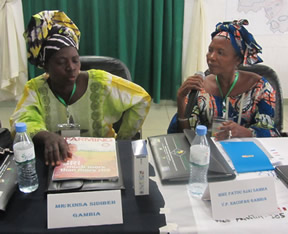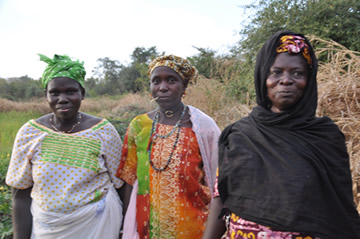SRI FEATURE ARTICLE: April 27, 2016
SRI Farmer Stories:
Meet Kinsa Sidibeh, an SRI farmer in Central River Region South, The Gambia
By Devon Jenkins
-
Kinsa Sidibeh isn't afraid to speak her mind. As the president of her women's farmer group, and the first to try SRI, she is used to playing a pioneering role among her peers. So when she traveled over 2,500 km to attend an SRI training and workshop in Kpalimé,
 Togo, her friends back home may not have been surprised to learn that, despite not speaking English or French, Kinsa had managed to rouse the entire training group to their feet in applause.
Togo, her friends back home may not have been surprised to learn that, despite not speaking English or French, Kinsa had managed to rouse the entire training group to their feet in applause.The Kpalimé workshop, held in August 2014, was the first technical training for the 13-country SRI-WAAPP project. Technicians, researchers, extension agents and farmers from all participating countries came together to learn the nuts and bolts of SRI, and to work out how they could adapt it to their own conditions back home. As part of the Gambian delegation, Kinsa (at left) worked hard to overcome her lack of English. Helped along be her fellow country members, including the head of the women farmers' federation, Fatou Njai (right) , Kinsa absorbed the information that was presented. In country groups each team developed adaptation strategies to put to the test upon their return, and drew ideas and suggestions from other countries around the region that share similar conditions.
Despite her silence through much of the training, on the final day Kinsa took the microphone and declared without hesitation, that what she had learned in Kpalimé would transform the reality of women farmers back home.
Upon returning Kinsa (far right) worked quickly to mobilize other farmers. After training her women's group, with support from the national WAAPP project and local institutions like NARI and NaCOFAG/NaWFA, Kinsa and her colleagues were able to bring their
 yields up to 4.5 t/ha – a substantial sum for Gambian farmers, and far more than the 1 t/ha she'd been getting before.
yields up to 4.5 t/ha – a substantial sum for Gambian farmers, and far more than the 1 t/ha she'd been getting before.Through her trainings, field trials, and positive yields, Kinsa's work spread the SRI methodology to 74 of the other women in her community to adopt SRI. It wasn't easy, and at first many farmers complained of the change in labor, and the difficulty in finding enough organic matter. With experience though comes understanding, and as the other farmers tried SRI they too became convinced. And in the process Kinsa became a model for other farmers in the region.
When the SRI-Rice team crossed paths with Kinsa again it was for the first national Gambian SRI training in December 2015. This event, held at the Sapu Agricultural Research Station not far from Kinsa's village, brought together a diverse collection of researchers, technicians, NGOs, government officials, managers of the President's extensive rice fields, farmers’ organizations, and of course Kinsa. Halfway through the first day, the trainees' initial curiosity gave way to enthusiasm and optimism as they saw the impacts that SRI has brought to farming communities around the world. But one question came to the forefront – could SRI work in The Gambia?
As the question echoed quickly from multiple people in the back of the room, and skepticism started replacing optimism, Kinsa jumped up, took hold of the microphone, and silenced the crowd.
After two seasons of SRI trials, and countless farmer interactions and trainings, she had no need for skepticism any more. With purpose and conviction she silenced the packed room with her story about the transformations she'd already seen in her community because of SRI. Before she finished her speech the entire room burst into applause, and any doubt that had been fomenting amongst the technicians and researchers instantly dissolved.

